Anglicans, Episcopalians head to Zambia for consultative councilPosted Apr 1, 2016 |
|
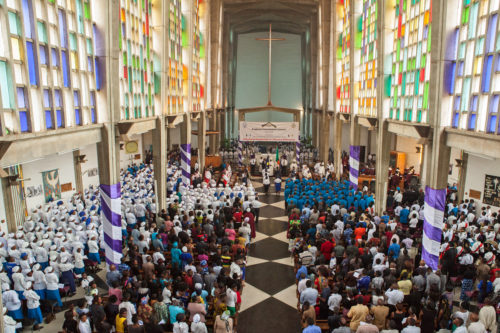
The local launch of the 16th meeting of the Anglican Consultative Council took place Nov. 29 in Lusaka Cathedral and gathered representatives from all the dioceses in the Province of Central Africa (Botswana, Malawi, Zimbabwe and Zambia). The meeting begins April 8 and runs until April 19. Photo: Anglican Communion Office.
[Episcopal News Service] The three Episcopal Church members of the Anglican Consultative Council hope the upcoming meeting in Lusaka, Zambia, will be a recognition, encouragement and expansion of Anglican mission and ministry across the world.
“The things we talked about at ACC-15 (in the fall of 2012) haven’t gone away: food security, clean water, climate change, gender-based violence, human trafficking, the persecution of religious minorities,” House of Deputies President the Rev. Gay Clark Jennings, the Episcopal Church clergy member of the ACC, said in an interview with Episcopal News Service.
“Those are the things that transcend our ecclesiastical differences and which are an enormous opportunity for the provinces of the Anglican Communion to strengthen the bonds of affection so that together we can heal a hurting world,” said Jennings, who will be attending her second ACC meeting.
The ACC’s objective, according to its constitution, is to “advance the Christian religion and in particular to promote the unity and purposes of the Churches of the Anglican Communion, in mission, evangelism, ecumenical relations, communication, administration and finance.” And, among the ACC’s powers listed in the constitution, is one that says it should “develop as far as possible agreed Anglican policies in the world mission of the church” and encourage the provinces to share their resources to work to accomplish those policies.
“That’s the purpose of the ACC – to come together to look at issues confronting the communion and the world, and then to discern ways to work together to change the world in the name of Christ,” Jennings said.
The meeting’s draft agenda includes time for the members to discuss all of those matters plus review the work of the Anglican Communion Secretariat.
The ACC is responsible for charting the work of the communion’s committees and networks, as well as that of the Anglican Communion staff and the communion’s Standing Committee. There are currently 10 thematic networks that address and profile various issues and areas of interest in the Anglican Communion. The networks will report on their work to the ACC during the Lusaka meeting.
The Standing Committee, the ACC’s executive arm, will meet in Lusaka during the two days prior to the start of the ACC meeting.
The ACC is one of three Instruments of Communion, the others being the Lambeth Conference of Anglican bishops and the Primates Meeting. The archbishop of Canterbury (who is president of the ACC) is seen as the “Focus for Unity” for the three instruments.
Formed in 1969, the ACC includes clergy and lay people, as well as bishops, among its delegates. The membership includes from one to three persons from each of the Anglican Communion’s 38 provinces, depending on the numerical size of each province. Where there are three members, there is a bishop, a priest and a lay person. Where fewer members are appointed, preference is given to lay membership.
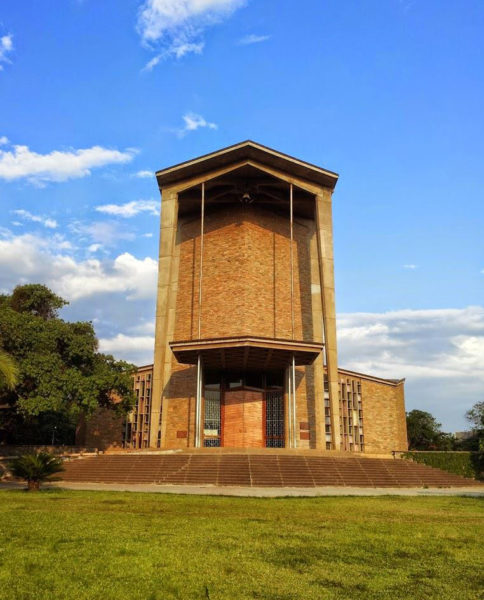
The Cathedral of the Holy Cross in Lusaka, Zambia, will host over 100 members of the Anglican Consultative Council for its 16th meeting April 8-19. Photo: Lusaka Cathedral
The council meets every three or four years and the Lusaka meeting is the council’s 16th session. The first meeting was held in Limuru, Kenya, in 1971. The ACC last met in late 2012 in Auckland, New Zealand. The ACC has not gathered in Africa since its ninth meeting in Cape Town, South Africa, in 1993.
Diocese of Connecticut Bishop Ian Douglas, one of the Episcopal Church’s three ACC members, told ENS recently that when the ACC gathers – roughly every three years – it embodies a “united witness that embraces all of our differences and cultures and languages of the churches of the Anglican Communion.”
The heart of any ACC meeting, as Douglas put it, is to worship together, study the Bible together, engage the communion’s important work and to see the church in the province that hosts the meeting.
“My hope and my expectation is that coming together in our differences – which has always been a centerpiece of the ACC – will also be at the heart of our time in Lusaka,” said Douglas, who will be attending his third and last ACC meeting. Douglas is also ending his term on the Standing Committee.
This gathering’s theme of “Intentional Discipleship in a World of Differences” was chosen by the Standing Committee, according to Douglas, by looking at the Anglican Communion’s mission and evangelism work and then asking “what is the shape of discipleship today in the post-colonial and post-modern era given the breadth of differences that we embrace in being in communion?”
Rosalie Ballentine, the Episcopal Church’s lay ACC member from the Diocese of the Virgin Islands, said in an interview that the beauty of the Anglican Communion is that “in spite of our disagreements – our grave disagreements sometimes – we know how to cooperate.”
Ballentine, who will be attending her first meeting, said she hopes in Lusaka to gain “a fuller understanding of work in the communion and how we as the Episcopal Church can continue to foster that work” and the church’s relationships with the other provinces.
“I’m thinking that there’s going to be perhaps some different perspectives that we can get, some better understandings of how we might work in spite of all the primatial angst,” said Ballentine, who for six years chaired the task forces that fashioned the Episcopal Church’s response to the Anglican Covenant.
In the early days of the ACC meeting that “primatial angst” over the ecclesiastical differences in the Anglican Communion may get the spotlight.
A majority of the leaders of the communion’s 38 provinces – known as primates – during their January gathering called for three years of “consequences” for the Episcopal Church in response to the 78th General Convention’s decision to change canonical language that defines marriage as being between a man and a woman (Resolution A036) and authorize two new marriage rites with language allowing them to be used by same-sex or opposite-sex couples (Resolution A054).
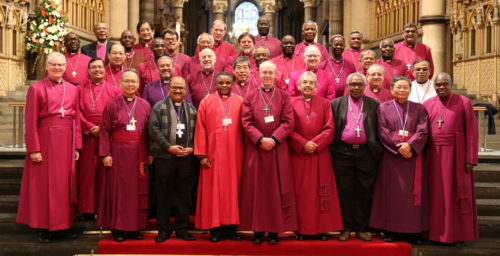
The primates of the Anglican Communion pose Jan. 14 near the end of their meeting in Canterbury Cathedral in England.
The primates said that they were “requiring” that for those three years the Episcopal Church not serve on ecumenical and interfaith bodies, not be appointed or elected to an internal standing committee, and “that while participating in the internal bodies of the Anglican Communion, they will not take part in decision-making on any issues pertaining to doctrine or polity.”
The consequences were how the majority of primates agreed to “walk together in the grace and love of Christ” despite what they called the “significant distance” the Episcopal Church created when, the primates said, it changed the doctrine of marriage without consulting the rest of the communion and obtaining agreement.
Presiding Bishop Michael Curry has said the General Convention did not see those actions as a change in doctrine but rather “an expansion of who can be eligible for marriage.” He said the convention will not rescind that expansion. He has also said that the Episcopal Church’s three ACC members will attend and participate in Lusaka.
It is not clear how the primates can enforce their requirement beyond appointments made by the Archbishop of Canterbury because their group has no governing document that gives it authority to impose penalties on any province. The Standing Committee, with the assent of two-thirds of the primates, may alter or add to the so-called schedule, the list of ACC “member-churches” included in the ACC’s constitution. But that power only pertains to defining membership, not the terms of a member’s participation.
“Our province is a member [of the ACC] and so therefore it’s our responsibility to attend and participate as representatives from a member province,” Jennings said. “As a member of the Anglican Consultative Council, I am bound to follow the constitution.”
Jennings pointed to the recent statement by retired Malawi Bishop James Tengatenga, who chairs the ACC, that the Episcopal Church delegation has the “right and responsibility” to attend the meeting and to vote.
Douglas said the Standing Committee will no doubt discuss the meaning of the primates’ consequences for the ACC but, it would be unusual for the committee to recommend a course of action to the ACC. It generally does not take a “directorial position but rather ensures that the decisions and actions of the ACC at its last meeting are fulfilled.”
Douglas sees two questions facing the ACC. One is the “very important question” of the relationship between the primates, the ACC and other communion bodies, and how the communion functions generally when faced with difficult issues, he said.
That conversation needs to happen separately from the question of consequences for the Episcopal Church’s action on the marriage canon, he said. “To conflate the two, I think, is problematic.”
He foresees the Standing Committee recommending how the ACC might handle discussion of both of those questions within the structure of the agenda as it is currently drafted.
“The main job of the Standing Committee is to serve the ACC, not to be an authority above the ACC,” Douglas said.
“None of this is new,” he added. The relationship between the Primates Meeting and the ACC “has always been a delicate balance.”
The last ACC meeting received a 56-page report (beginning on page 33 here) about the relationships between the instruments of communion.
Archbishop of Canterbury Justin Welby noted in his presidential address to the Church of England’s General Synod meeting a month after the primates met that their decision “binds the primates as a group, but not any province or other Instrument of Communion.”
More recently, in a letter dated March 16, Welby told the 38 primates that it has been “well recognized” since 1857 that no single body within the Anglican Communion has power over individual provinces.
Instead, he said, “the decisions we took in January can only have effect if they gain general ownership in the Communion, taking in laity, priests and bishops.”
The first three days of the ACC’s meeting are titled “establishing the ACC Community” and a report on the primates gathering is slated for the afternoon of April 8.
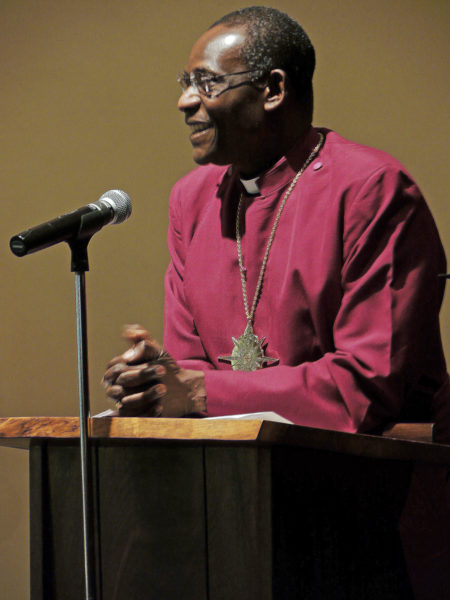
The Most Rev. Josiah Atkins Idowu-Fearon speaks to Anglican and Episcopal women meeting March 16 in the Chapel of Christ the Lord at the Episcopal Church Center in New York. Photo: Mary Frances Schjonberg
The Most Rev. Josiah Atkins Idowu-Fearon, secretary general of the Anglican Communion, said in a March interview at the Episcopal Church Center that his role in the issue will be based on the actions of the ACC.
“I think your primate has made his reflections clear. The Archbishop of Canterbury has made his reflections clear. ACC will now reflect and when the ACC reflects, that will now give me a base on which to say this is what I want to do,” Idowu-Fearon said. “So, my comments will not be until my bosses have spoken and then I will sum up what my bosses have said and nobody can hold me responsible because I’m only the voice for the communion based on the Instruments (of Communion).”
Earlier this year and after the primates gathering, the secretary general said that as much as Episcopalians are scandalized by the criminalization of homosexuality in some parts of the world, other Anglicans are scandalized by General Convention’s actions on marriage.
Idowu-Fearon said the Episcopal Church’s support of gay and lesbian rights around the world inspired him.
“But changing the doctrine of marriage to include those same people has not inspired most of the Anglican family,” he said. “Because they are in communion with you, and choose to walk with you even though they cannot agree with or receive the decision of the General Convention, they are perceived as being pro-gay churches. Being in communion with you threatens their witness to the same Lord Jesus, especially but not only in Muslim contexts, where the cultural sensibilities about human sexuality are so very different. In short, your decision puts many of us at risk.”
Saying that the Episcopal Church “remains a vital and loved member of the family,” the secretary general acknowledged that the primates’ requirement was a call for all the provinces “to accept a costly and painful unity.”
That unity might not be officially represented in Lusaka. Three provincial leaders – Uganda Archbishop Stanley Ntagali, Nigerian Archbishop Nicholas Okoh and Kenyan Archbishop Eliud Wabukala – have all said that their provinces will not send their ACC members to the meeting. (Ntagali’s statement is here, Okoh’s is here and Wabukala’s is here.)
All three men cited in part the Episcopal Church ACC members’ plans to participate fully in the Lusaka meeting and Tengatenga’s statement about their right to do so.
Okoh said the meeting would be just the next step in which those Anglicans whom he called “scripture-believers” are now “candidates for whom every opportunity in the Anglican Communion should be explored to gradually teach us to embrace the new sex culture.”
He also praised the U.K. government’s efforts to be given what he called a “special status” in the European Union because of its disagreements with how that organization works and the rules it imposes on its members.
“The Anglican Communion should begin to think in that direction for those provinces that may never, for obvious reasons, embrace the sexual culture being promoted by some provinces of the church over and against the Bible as we received it,” he wrote. “We need a ‘special status’.”
Wabukala also rejected Welby’s March 16 appeal for all provinces to send representatives to Lusaka, saying some primates had concluded that “the best way to make our voices known is by absence rather than presence.”
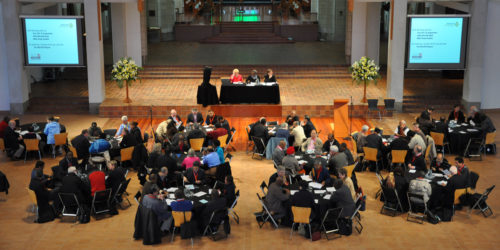
The Anglican Consultative Council last met Oct. 27-Nov. 7, 2012, mainly at Holy Trinity Cathedral in Auckland, New Zealand. The ACC includes clergy, lay people and bishops with one to three persons from each of the Anglican Communion’s 38 provinces, depending on the numerical size of each province. Photo: Mary Frances Schjonberg/Episcopal News Service
When the council last gathered in 2012 in Auckland, New Zealand, no province officially declined to attend but Uganda forgot to appoint its members, according to then-Anglican Communion General Secretary Kenneth Kearon.
While some Anglican Communion-watching blogs have reported that Welby’s March 16 letter asked all 38 primates to attend the meeting, he did not actually make that appeal. Rather the archbishop wrote that that it is his hope and prayer that “every province that is able will be represented in Lusaka.”
Primates attend ACC meetings only if they are on the Standing Committee. Then-Presiding Bishop Katharine Jefferts Schori attended ACC meetings in 2009 and 2012 in that capacity. West Indies Archbishop John Holder has been elected by his colleagues to succeed her and represent the Americas and the Caribbean. Archbishops Richard Clarke from Ireland, Philip Freier of Australia, Mouneer Hanna Anis from Jerusalem and the Middle East, and Thabo Makgoba of Southern Africa are the other primatial members.
Thus, Presiding Bishop Curry will not be at the meeting because he is not one of the church’s three ACC members, nor is he on the Standing Committee.
ENS coverage of the meeting can be found here.
– The Rev. Mary Frances Schjonberg is an editor/reporter for the Episcopal News Service.

Social Menu